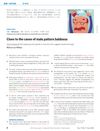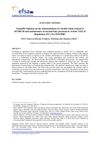Boosting certain cell signals can prevent hair loss from chemotherapy and radiation.
September 2017 in “Korean journal of acupuncture” Crataegi Fructus water extract helps hair grow better and thicker.
Traditional Korean medicine uses methods like acupuncture and herbs for abnormal hair growth, and combining these with modern technology could improve cosmetology.
November 2016 in “韓方眼耳鼻咽喉皮膚科學會誌 = The journal of Korean Medicine Ophthalmology & Otolaryngology & Dermatology” Laser therapy and acupuncture helped regrow hair in a patient.
 49 citations,
April 2015 in “Emerging Infectious Diseases”
49 citations,
April 2015 in “Emerging Infectious Diseases” Artesunate is generally safe for severe malaria, but patients should be monitored for delayed anemia after treatment.

Korean herbal extracts may promote hair growth.

Testosterone in human pancreas cells boosts insulin production.
 January 2025 in “Balkan Medical Journal”
January 2025 in “Balkan Medical Journal” Baricitinib helps regrow hair in severe alopecia areata and is safe, but more research is needed.
14 citations,
November 2019 in “Materials” Diamond nanoparticles can penetrate skin and reach hair follicles, useful for imaging applications.
 1 citations,
June 2017 in “Journal of the American Academy of Dermatology”
1 citations,
June 2017 in “Journal of the American Academy of Dermatology” Oral tofacitinib may be an effective and tolerable treatment for some people with severe alopecia areata.
 June 2012 in “Nature digest”
June 2012 in “Nature digest” A substance called prostaglandin D2 is linked to stopping hair growth in men with common baldness.
 9 citations,
December 2014 in “Neuropsychiatric Disease and Treatment”
9 citations,
December 2014 in “Neuropsychiatric Disease and Treatment” People with first-time vitiligo have lower levels of a certain brain protein compared to healthy individuals.

The document's conclusion cannot be provided because the document cannot be parsed.
 4 citations,
March 2013 in “Neuropsychiatric Disease and Treatment”
4 citations,
March 2013 in “Neuropsychiatric Disease and Treatment” A woman with anorexia and Cushing's syndrome improved after tumor removal, highlighting the need to consider hormonal issues in psychiatric conditions.
 4 citations,
December 2020 in “Neuropsychiatric Disease and Treatment”
4 citations,
December 2020 in “Neuropsychiatric Disease and Treatment” Women with skin conditions who have body image concerns often experience mental health issues and a lower quality of life.
 2 citations,
January 2012 in “Hair therapy & transplantation”
2 citations,
January 2012 in “Hair therapy & transplantation” DDAIP-HCl significantly increases minoxidil absorption into the skin.
 January 2023 in “Annales de dermatologie et de vénéréologie, FMC”
January 2023 in “Annales de dermatologie et de vénéréologie, FMC” Black skin requires specific cosmetic practices, which can sometimes cause skin issues due to product misuse, and there's a need for better regulations in sub-Saharan Africa.
 April 2018 in “Journal of Investigative Dermatology”
April 2018 in “Journal of Investigative Dermatology” FOL-005, a hair growth promoter, acts locally on mouse skin where injected and could be a promising hair loss treatment.
 April 2018 in “Journal of Investigative Dermatology”
April 2018 in “Journal of Investigative Dermatology” Higher levels of nidogen1 and type IV collagen are found in basal cell carcinoma compared to normal skin.
 2 citations,
August 2022 in “The journal of investigative dermatology/Journal of investigative dermatology”
2 citations,
August 2022 in “The journal of investigative dermatology/Journal of investigative dermatology” A specific mutation in the K25 gene causes a rare genetic disorder with curly hair at birth and later hair loss, along with dental issues.
 April 2019 in “Journal of Investigative Dermatology”
April 2019 in “Journal of Investigative Dermatology” Eating grape powder may reduce the severity of skin allergy symptoms.
12 citations,
June 2017 in “Dermatologic therapy” Higher concentrations of dithranol can help regrow hair in severe alopecia areata.
 April 2018 in “Journal of Investigative Dermatology”
April 2018 in “Journal of Investigative Dermatology” CREB, a protein that can promote cancer traits, is controlled by β-catenin in skin cancer cells.
 2 citations,
April 2018 in “Journal of Investigative Dermatology”
2 citations,
April 2018 in “Journal of Investigative Dermatology” Intralesional chemotherapy with 5-fluorouracil and methotrexate may worsen keratoacanthoma-type skin cancer in transplant patients.
24 citations,
March 2010 in “Journal of Cellular Biochemistry” Nestin-expressing blood vessels help skin transplants survive and heal.
 January 2018 in “Archives of general internal medicine”
January 2018 in “Archives of general internal medicine” The document concludes that automatic biofiber hair implant is a new method for improving hair growth.
January 2020 in “Brazilian Journal of Pharmaceutical Sciences” Finasteride worsens heart damage from nandrolone decanoate but protects against cell damage.
 March 2023 in “Медицинский совет”
March 2023 in “Медицинский совет” COVID-19 may cause different types of hair loss, and the virus's effects on hair could help understand its impact on other body parts.
 1 citations,
July 2012 in “EFSA journal”
1 citations,
July 2012 in “EFSA journal” KF2BL20 does not have proven benefits for maintaining normal hair.




















